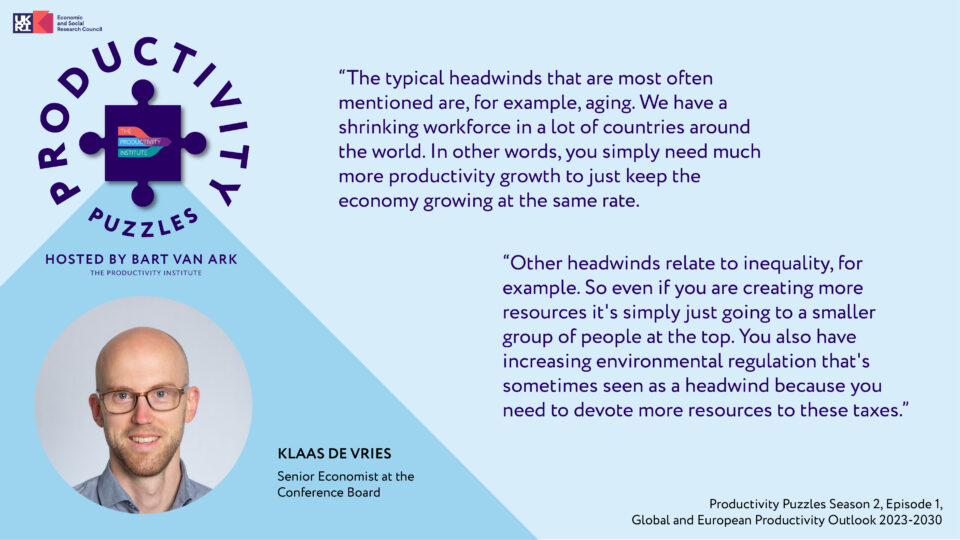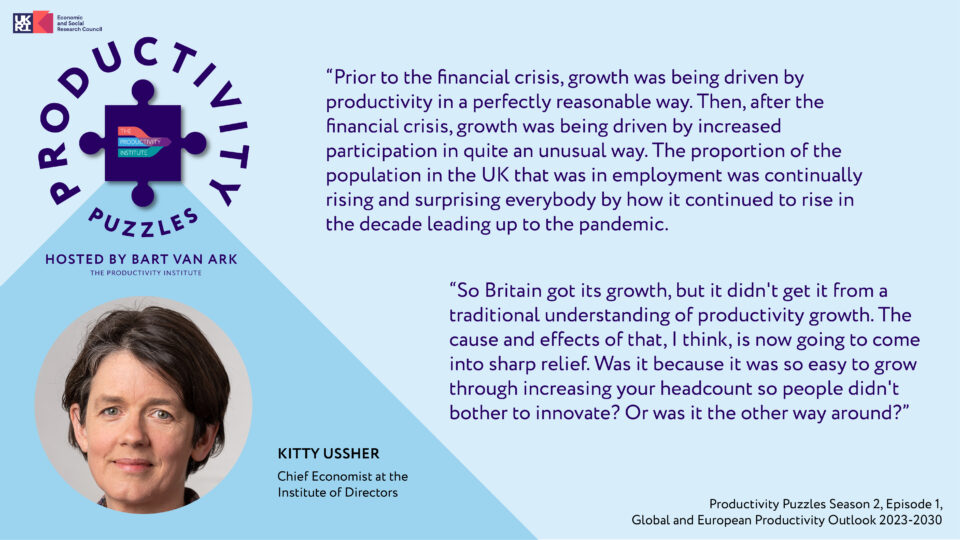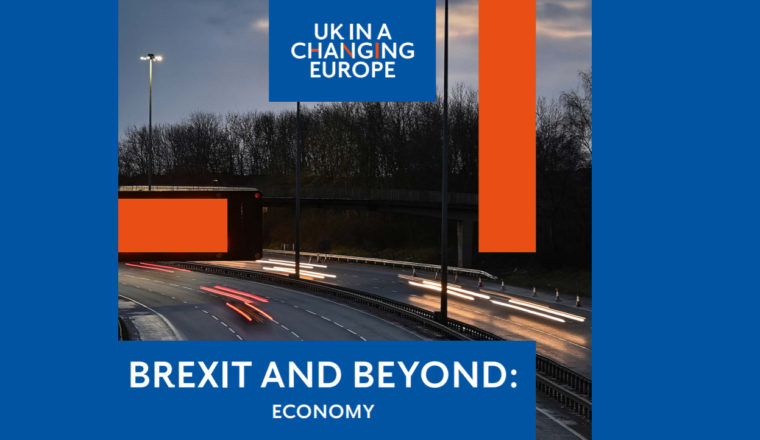Global and European Productivity Outlook: Productivity Puzzles blog
Productivity growth has been weak in the past decade, and the last few years have been challenging. But where is productivity heading – in the UK, around Europe, even around the world?
The first episode of Productivity Puzzles’ second season takes a forward-looking perspective and considers where productivity in the UK, and across Europe and the US, is heading. More importantly, it looks at what needs to be done to realise the upside of those projections. This blog highlights some of the discussions had on the podcast by the host, Bart van Ark, and his guests.
“Productivity overall is by far the most important driver of economic growth, and growth in living standards, at least over longer-term periods.”
Klaas de Vries
Klaas de Vries
Klaas works for The Conference Board, whose Total Economy Database offers extensive data on global productivity growth.
He suggests on the podcast that, with all the economic challenges ahead of us, it is hard to see a large acceleration in the contribution of investment and capital to productivity. But it is expected that the contribution for mature economies will recover to its long-term level over the next decade. It then all depends on whether Total Factor Productivity (TFP) – the efficiency by which labour and capital is being used – can strengthen again, and that is mostly likely to happen if technology and innovation strengthen.
“The annual average labour productivity growth in mature economies that we [The Conference Board] are projecting is about 1.5 per cent for the remainder of this decade. We think it’s more likely around 2.7 per cent for emerging markets and developing economies for the next decade.
“It’s not too bad, but if you look at it in a historical perspective, for example, going back just two decades, we often had growth rates in the range of 2.5 to 3.0 per cent for global productivity growth.”
Klaas de Vries
Alongside strengthening investment more broadly, improving technology and innovation is considered as one of the ways to unlock more productivity growth. But should people be techno-optimists or techno-pessimists? According to Klaas, an optimist may argue that growth is still being made, while the economy is changing with services, digital and intangibles, which may not be captured by official statistics. On the other hand, a pessimist may point to the difficulty of finding new transformative ideas, the weakening of innovation systems and significant headwinds that are making innovation difficult.
Catherine Mann
In the podcast, Catherine, who is an external member of the Bank of England’s Monetary Policy Committee, analyses the outlook for productivity for 2023 and beyond. She explains that there has been a slowdown in the past decade and half in both mature and emerging markets and identifies two key factors:
- The overall slowdown in the growth in investment
- The slowdown in Total Factor Productivity
Emerging markets still saw a big increase in investment and capital, but the productivity of those investment has started to decline rapidly – driven in particular by China but also other emerging markets.
For mature economies, there has been a productivity slowdown everywhere. It has been particularly large in the UK, but also in Italy and Spain and even the US.
With any discussion about productivity growth, it is important to do a decomposition into the frontier and then the firms behind the frontier, says Catherine. This can be done in the context of an individual country, or in the context of the global economy as well.
“It is an important feature of the productivity dynamics that the US, at the frontier, has slowed. And this is important because it’s like the leader in a race slowing down, yet those behind are not catching up.”
Catherine Mann
She looks at the matter in further detail on the podcast:
What is going on at the frontier?
- There is some evidence of reduced competition at the frontier, as companies that used to compete with each other for innovation take over market share. Increasingly there have been mergers and acquisitions of companies at the frontier, so there is less pressure to innovate.
- A retreat from globalisation has led to a retreat from that global competition as well.
Why is there not catch-up by the countries that could have been close to the frontier?
- The retreat from globalisation also impacts economies behind the frontier, because one avenue through which firms become more productive is engagement with frontier companies.
- Data externalities are increasingly integral to firms. Small companies have a small amount of data, but they rarely benefit from data aggregation.
Kitty Ussher
Kitty, who is Chief Economist at the Institute of Directors (IoD), discusses what UK productivity will look like in 2023 and 2024 compared to previous years. Before the financial crisis, growth in the UK was driven by productivity in the usual way, she says, but post-crisis it has been pushed up by increased participation, which is quite unusual.
However, there are reasons to be positive, she says; the structural changes forced by the pandemic are potentially very exciting once these crises settle down. Greater merger and acquisition activity leads to reorganisation, with weaker firms being wiped out. While increased innovation in ways of working, such as remote working and digitisation, will settle into their most efficient format.
Kitty also investigates the role of investment and policy in improving productivity. A recent Institute of Directors report, How To Increase Business Investment, brought forward some important ideas about the policy measures needed to get the required pace of investment.
Decades of academic research show that there are some things that are clearly correlated – levels of investment and levels of skills are correlated with productivity, and that supports GDP. Is there a role for policymakers to encourage that investment when there is a market failure? Kitty examines some potential avenues:
- Training up a certain skill internally in your team can be costly and time-consuming, but that employee may leave the company for a competitor. This seems like a market failure. There should be a form of tax credit system for training in skills shortages areas.
- On the capital side, IoD data shows that the super-deduction that was introduced as a temporary measure coming out of the pandemic has had a measurable positive impact on investment. There is a clear economic policy argument to continue it.
While the outlook for productivity isn’t great, it is not impossible to look for the upside, concludes Bart van Ark:
“There are certainly steps that policymakers can take that can get us at the higher end of the forecast range, and ways in which businesses can effectively respond. That would help enormously, because as mentioned, productivity is such an important driver for the development of the economy, for economic growth and for the improvement of living standards.”
The Productivity Puzzles Podcast episode Global and European Productivity Outlook 2023-2030 is available on our website, or wherever you get your podcasts.





